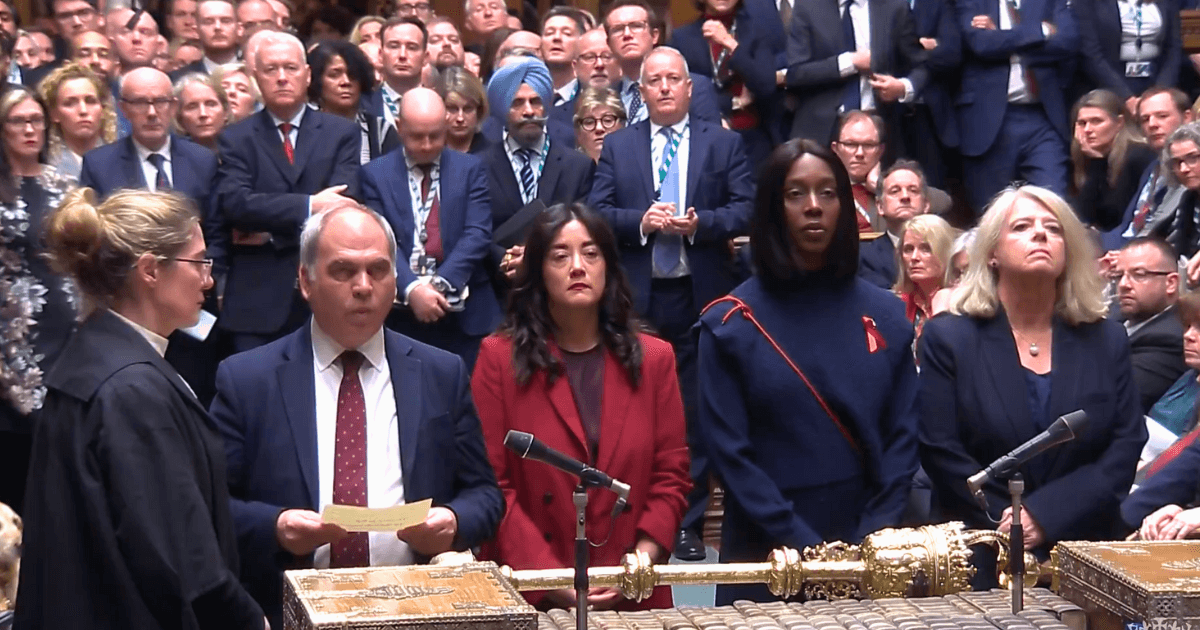After MPs voted through Kim Leadbeater’s Terminally Ill Adults (End of Life) Bill at Second Reading on Friday, an analysis has indicated that as many as 36 MPs who voted in favour of the legislation could vote against it at a later stage depending upon how the Bill stands up to scrutiny.
This analysis shows there is a clear path towards the assisted suicide Bill being defeated at Third Reading. With the vote passing by a margin of only 55, just 28 MPs switching their stance to oppose the Bill would ensure it is defeated at Third Reading.
During the debate, MPs emphasised a number of important problems with the assisted suicide Bill, which other MPs who may withdraw their support are likely to see as needing redress.
Problems with process
Though not the main focus of contention, a number of MPs, including Danny Kruger, Rachael Maskell and Tim Farron, criticised the process for this Bill, especially how rushed the Bill has been.
In particular, Kruger argued that the Bill was “simply too big for the time that it has been given” and he asked other MPs not “to hide behind the fiction that it can be amended substantially in Committee and in its later stages. The remaining stages of a Private Member’s Bill are for minor tweaks, not the kind of wholesale restructuring that we would need if we were ever to make this Bill safe”.
Labour MP Paulette Hamilton said “There are too many blind spots, and it is being rushed through too quickly and with too little scrutiny. It would place enormous pressure on disabled, elderly and poor people to opt to end their lives so as not to be a burden on their loved ones”.
The text of the Leadbeater Bill was published barely two weeks before the vote, compared with the 49 days MPs had to scrutinise the last assisted suicide bill in 2015.
Coercion
Mother of the House Diane Abbott, Danny Kruger, Rachael Maskell, Dr Ben Spencer, Tim Farron, Anna Dixon and Carla Lockhart all discussed the potential for coercion to assisted suicide that this Bill creates.
Kruger, Farron and Maskell made particular reference to the problem of “self-coercion”, an issue that the Bill does not even attempt to address, where a person ends their life or is tempted to end their life, in order to avoid being a burden.
Tim Farron said “[T]here is the risk of self-coercion. Many of us will have heard older relatives utter words similar to, ‘I am a burden to you. You would be better off without me.’ We all know reasonably instinctively that people will present it as making a sovereign choice, but it will be a choice born out of coercion. Unless there is a clause in the Bill that I have missed to employ mind readers, no amount of doctors, safeguards or bureaucratic mechanisms will prevent those who self-coerce from opting to die simply because they assume that no matter what their loved ones say, everyone would be better off if they were dead”.
Kruger referred to self-coercion, as opposed to external coercion from others such as family and the state, as the “bigger danger”.
“The Bill has nothing to say on that. Internal pressure is absolutely fine. If you feel worthless or a burden to others, if the NHS will not offer you the treatment you need, if the local authority will not make the adjustments you need to your home, if you have to wait too long for a hospital appointment, or if you want to die because you think the system has failed you, that is absolutely fine”, he said.
Labour MP Rachael Maskell made the same point saying “Intrinsic coercion is very real, not least where the law has changed—rapidly becoming an expectation, verbalised as a duty to die. In fact, not wanting to be a burden is cited as a major reason to opt for an assisted death, alongside loss of dignity, loneliness, and needing personal care, yet every day, disabled people live in this reality”.
While these MPs emphasised self-coercion as a major shortcoming of the assisted suicide Bill, other MPs emphasised the possibility of coercion from others. Diane Abbott said “We are told that there is no evidence of coercion in jurisdictions where assisted suicide is possible, but people do not generally write letters to sick relatives urging them to consider assisted suicide and then put those letters on file. Coercion in the family context can be about not what you say but what you do not say—the long, meaningful pause”.
“That is the point: coercion is something that there will be no material evidence of and that we cannot see”, she added.
Labour MP Anna Dixon said “Older and disabled people with a terminal illness may feel an unspoken pressure to go down the route of assisted dying to protect their inheritance, or because they do not want to be a burden. There is a real, direct risk of coercion”.
Leadbeater dismissed such concerns insisting that the Bill’s “strict safeguards” would be sufficient.
Terminal illness
Difficulties with defining and accurately predicting ‘terminal illness’ are what Danny Kruger referred to as “the essential flaw in the Bill”.
“Almost anybody with a serious illness or disability could fit the definition. I recognise that these are not the cases that [Leadbeater] has in mind—of course they are not—but that is the problem with the Bill. All that someone needs to do to qualify for an assisted death—for the definition of terminal illness—is refuse treatment, such as insulin if the person is diabetic”.
“In the case of eating disorders… a person just needs to refuse food. The evidence from jurisdictions around the world, and our own jurisprudence, shows that that would be enough to qualify someone for an assisted death”.
He added that the “Bill’s scope is very broad. Members who think that assisted suicide for people with anorexia or other conditions that would not be regarded as terminal could not happen here should consider the young people in the UK today who are given a diagnosis of terminal anorexia and put on a palliative care pathway—essentially, assigned to death”.
Dr Ben Spencer also drew attention to difficulties with the concept of terminal illness. “Why is this Bill limited to the terminally ill and not those who are suffering without that being terminal?” he asked. “What even comes within the scope of terminal illness? With the refusal of treatment and medication, conditions such as type 1 diabetes and HIV can be designated as terminal, despite being fully treatable”.
“There are many questions, but in this Bill the most prominent problem is that, in a legal context, if the availability of assisted dying is limited only to those who are terminally ill, it is discriminatory either to those with or without terminal illness. Either their right to autonomy is greater than others’, or the value of their life is worth less”.
Lockhart concurred saying “As has been the case in every country where such legislation has been introduced, it would see the rapid expansion of eligibility criteria, and it cannot protect against the unreliability of a terminal diagnosis. When we look at the complications of the drugs used in places such as Oregon, we see that it would not guarantee a good death”.
Expansion of the legislation
A number of MPs also drew attention to the possibility of the expansion of the criteria for assisted suicide referring both to other jurisdictions in which this has already happened, and to the ways in which the Leadbeater Bill as written could expand.
Sir John Hayes said “Neither shall I talk too much about what happens in other jurisdictions, except to say that it is certainly true that everywhere it has been introduced, assisted dying has expanded—not always by subsequent legislation, but often through judicial interpretation”.
DUP MP Jim Shannon questioned Leadbeater saying “I remind her that Belgium started off with a simple project like the one she refers to but it deteriorated and expanded to include sufferers of dementia and under-18s—children. What guarantees do we have that this legislation will not end up with a situation like that in Belgium, in which case anything goes? Is that what the Hon. Lady wants? I do not want that. Does she?”.
Sir Oliver Dowden raised his concerns about the possibility of “judicial activism” where new meaning is given to words in the Bill not intended by MPs voting on the Bill “[W]e have seen, time and again excessive judicial activism taking the words in this House and expanding their meaning into places we had not foreseen. What reassurances can she give that the words in her Bill will be respected by the judiciary and that we will not find ourselves in a decade’s time in a totally different place that this House did not intend?”
Palliative care
Danny Kruger, Diane Abbott, Rachael Maskell, Sir Edward Leigh and Tim Farron also drew attention to problems with the palliative care available, suggesting that the solution to suffering at the end of life lay here rather than in the state facilitating suicide.
Danny Kruger said “My view is that if we get our broken palliative care system right and our wonderful hospices properly funded, we can do so much more for all the people who we will hear about today, using modern pain relief and therapies to help everybody die with a minimum of suffering when the time comes. We will not be able to do that if we introduce this new option; instead, we will expose many more people to harm”.
The Mother of the House drew attention to the fact that “If the Bill passes, we will have the NHS as a 100% funded suicide service, but palliative care will be funded only at 30% at best”, while the Father of the House, Sir Edward Leigh, said “doctors are there to prolong life and palliate symptoms. Were this to change, then we would not be doctors in the eyes of many, but bringers of death, agents of a state which counts its weakest members as expendable and worthy of nothing but an early grave”.
“A lot of the impetus around this debate, and the reason why people in opinion polls are apparently supportive of this measure, is that they are terrified of dying in pain. There is no need for this. When I talk to consultants and practitioners in palliative care, they say that they can manage pain”.
Labour MP Rachael Maskell drew attention to funding issues with and lack of access to palliative care in her speech saying “Funding for palliative care has regressed against rising demand in an ageing society with growing comorbidities. Hospices are paring back services. Research by the Anscombe Bioethics Centre in Oxford highlights how jurisdictions with assisted dying fall down the rankings on palliative care, while promised funding never materialises. When more than 100,000 people, predominantly in poverty, from minoritised communities or based on postcode, fail to access any palliative care despite needing it, or when those who access care do so from frequently overstretched services, unable to make timely or optimised interventions, or when, for most, care starts far too late, tragic testimonies follow, as we have heard in recent days”.
“We all know that the NHS is under significant duress, and just cannot do what it should. Social care is fragmented and costly, and palliative care is significantly underfunded and inequitable. This is a mess. Following Lord Darzi’s devastating report, we must give my Right Hon. Friend the Health Secretary the opportunity to reset health and care. I believe that that is what we on these Benches were elected to do”.
Tim Farron said “We all know what is coming. Assisted dying means a shift in focus away from helping people to live in dignity and comfort, towards simply helping people to die. Then, it becomes a self-fulfilling prophecy. Let us not kid ourselves: palliative care is a postcode lottery in this country, especially for the poor and the old. If the motivation of those who choose assisted dying is to end their pain, we can be absolutely certain that those NHS trusts with the weakest palliative care offer will be those with the highest incidence of people choosing to die. In other words, it will not really be their choice at all”.
“A cliff edge”
Former Conservative party leadership candidate, Robert Jenrick, said “The Bill is not so much a slippery slope as a cliff edge. When we walk out of this Chamber, or out of the gates of this building tonight, we will, in a way, walk into a different country if the Bill passes. There will be different conversations around kitchen tables. There will be different conversations had by couples lying in bed at night, or on quiet country walks where people talk about difficult things. They will not be conversations that make our country a better place”.
“More important, there will be people who do not speak about these things at all. There will be imperceptible changes in behaviours. There will be the grandmother who worries about her grandchildren’s inheritance if she does not end her life. There will be the widow who relies on the kindness of strangers who worries—it preys on her conscience. There will be people—we all know them in our lives—who are shy, who have low self-esteem, who have demons within them. I know those people. I can see them in my mind’s eye. They are often poor. They are vulnerable. They are the weakest in our society. And they look to us, to Parliament, to represent them, to support them, to protect them. In their interests, I am going to vote against the Bill today. Sometimes we must fetter our freedoms. We the competent, the capable, the informed sometimes must put the most vulnerable in society first”.
Spokesperson for Right To Life UK, Catherine Robinson, said “On Friday, MPs opposed to the Bill raised a number of serious difficulties which, if not addressed, could see enough MPs who voted in favour of the assisted suicide Bill change their allegiance. Patients ending their lives due to feeling like a burden, the possible expansion of the law and the possibility of coercion are all problems intrinsic to assisted suicide legislation that cannot be amended away”.












